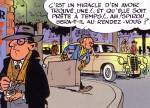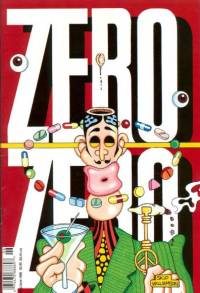
December 22, 2008
 CR Holiday Interview #1: Kim Thompson
CR Holiday Interview #1: Kim Thompson


*****
I've known Kim Thompson since 1994, when I went to work for him at
Fantagraphics Books. He's among the smartest people I've ever met, and is one of the kindest. Together with his longtime publishing partner
Gary Groth, Thompson has worked the last several years transforming the longtime alternative comics company he co-owns into a small but potent comics, art book and graphic novel publishing house. Having spent much of his youth in Europe, he has been one of North America's most effective advocates for translated books from the rich French-language tradition. He is also a talented editor, a fine interviewer with whom I worked at
The Comics Journal and generally informed and involved when it comes to all aspects of how that company functions. If Fantagraphics were a car, Kim would be the guy in the jumpsuit and dirty fingernails constantly poking around under its hood. He was nice enough to talk to me about his company's future and recent past. -- Tom Spurgeon
*****
TOM SPURGEON: After 30-plus years in the comics industry, how do you keep motivated? What do you find exciting about your job right now?
KIM THOMPSON: There is always some new cartoonist, or some new work by an cartoonist, on the horizon to snap me out of my depressed torpor. And we've got such a great bunch of people working for us now here in the office... that's energizing. That said, I wish I didn't have to answer this on a goddamn Monday morning.
SPURGEON: As a long-time champion of European comics, how satisfying is it for you to see this second great wave of translated European works hitting the American market?
THOMPSON: It's pretty exciting, although of course we don't know yet whether this wave will prove more durable than the last one. We've got three major, major European cartoonists planned to launch in 2009-2010 ourselves. Even if the wave crashes, at least we'll have gotten out another batch of great books that will survive on Amazon.com as used books for a few years.
 SPURGEON: Does Fantagraphics have a specific strategy for approaching European cartoonists, or does a Jason, say, just kind of move into your orbit organically the same way that any other artists does? Are there any artists or kinds of work from Europe you're interested in publishing in the future?
SPURGEON: Does Fantagraphics have a specific strategy for approaching European cartoonists, or does a Jason, say, just kind of move into your orbit organically the same way that any other artists does? Are there any artists or kinds of work from Europe you're interested in publishing in the future?
THOMPSON: There is still a bewilderingly huge amount of great European work that hasn't been released in English (or was released in English back during the first Eurocomics boom and has since fallen out of print). I don't know if there is a "kind"
per se, but I think we need to catch back up with the masters who emerged in the 1970s and 1980s, your
[Jacques] Tardis and
[Lorenzo] Mattottis and
Loustals and
Munozes and so on.
NBM,
First Second and
Drawn & Quarterly seem to be doing a good job with the 1990s/millennial generation.

I'd still love to publish my favorite European kids' comics guys like
[Andre] Franquin and
[Maurice] Tillieux, of course, but I've long since given up on this idea as being totally unworkable in the American market. If I win the lotto and can throw $100K down the toilet just for fun, look for an announcement.
SPURGEON: Comics seem poised to take an even bigger leap into various on-line formats over the next 24 months. Is Fantagraphics interested in further working with their artists to publish them on-line in a more significant way? What kind of discussions have you had in-house about this?
THOMPSON: Man, I'm not the one to ask about on-line comics. It's low on my list of priorities, possibly foolishly so.
SPURGEON: Have you had any talks internally about the possibility of a sustained economic downturn? Have you made any moves or do you plan any moves to meet the possible challenges of rough times? Are you worried about the months ahead?
THOMPSON: Of course we're worried, but it's such
terra incognita, no one knows where this is going and no one knows how specifically this might affect the comic book field. Maybe comic books will be the only entertainment people can afford and sales will surge. (Although probably not.) We're probably going to be more conservative in terms of new projects and print runs. I just turned down a project that a year or two ago we might've said yes to.
SPURGEON: Considering that there are two of you as publisher, how do you Gary and decide what to publish? Is it true there are Gary books and there are Kim books? Do you ever publish books that one or the other of you isn't enthused about?
THOMPSON: Sure. We're two different people with different tastes, and we're also self-aware enough to know that there are cartoonists one of us doesn't like that are objectively speaking fine cartoonists worthy of being published. The percentage of books that both of us aren't totally enthusiastic about is pretty small, in any event, so in most cases we're on the same page. There has never been a project one of us hated so much he tried to talk the other one out of publishing, maybe a few cases of "Jeez,
really? OK, whatever."
 SPURGEON: Are there any publishing initiatives from the last 15 years that you wish could have succeeded that maybe didn't to the extent you felt they might? For instance, I thought Lewis Trondheim's
SPURGEON: Are there any publishing initiatives from the last 15 years that you wish could have succeeded that maybe didn't to the extent you felt they might? For instance, I thought Lewis Trondheim's The Nimrod
was a near-perfect alternative comic.
THOMPSON: Yeah, although we were running out of Trondheim material that fit that format, so it likely would've ended after we finished the
Approximativement serialization. In general, I'm really sorry that the alternative pamphlet format has crashed and burned, it's now basically impossible to launch a new cartoonist in that format, and a number of more established cartoonists aren't pulling in sufficient numbers to justify it. The
Raisin Pie and
Fuzz and Pluck numbers were unbelievably bad, for instance, and even "successes" like
Uptight and
Tales Designed To Thrizzle are at best marginal. And every time we think the numbers have bottomed out we find a new bottom.
The Ignatz books are barely break even but then I expected that, so I'm not exactly disappointed.
There are individual cartoonists whose books failed I'm bummed about, of course.
SPURGEON: I think your books have looked consistently great over the last five years. You've had some great designers in the past, but it seems like you now have a really solid, consistent art department in the way that Eric Reynolds had given you guys a an anchor in marketing/PR. How important is good design to what you guys have been able to achieve in recent years? What are your own tastes when it comes to design?
 THOMPSON:
THOMPSON: Nothing more sophisticated than I know what I like, and I agree that
Adam Grano and
Jacob Covey are doing a bang-up job. Frankly -- and our designers hate it when I say this -- I think a lot of books are sort of design-proof in terms of sales, although some benefit significantly from superior design, and some are totally saved by design. Clearly
Chris Ware's design of the
Krazy and Ignatz books gave those a boost, and Jacob Covey's
Popeye surely moved some extra units.
That said, the standard of design for graphic novels has really peaked in the last decade, and you sort of have to have at least decent design if you want to be taken seriously. We couldn't get away with the crappy Fantagraphics/Eclipse/NBM/Last Gasp designs of the 1980s any more, that's for sure. So I'd say decent design is a necessity and great design is a bonus.
 SPURGEON: I think you're an under-appreciated editor, particularly your anthologies. Titles like
SPURGEON: I think you're an under-appreciated editor, particularly your anthologies. Titles like Critters
and Zero Zero
look better in retrospect with each passing year. Why so few? Do you have another magazine in you somewhere? Do you enjoy that kind of hands-on curating process? How do you look back on each of those anthologies now?
THOMPSON: Thank you for that. I thought
Critters was great for its time, although that kind of "indy" material (with the exception of
Usagi Yojimbo) seems to have fallen through the cracks and no longer has any audience at all -- and it's looked askance at by "alternative" loyalists. Are any of the
Critters guys other than
[Stan] Sakai still actively publishing comics? I mean, what kind of a stupid industry lets a guy like
Mike Kazaleh slip away into self-publishing and, basically, retirement from comics?

Anthologies are a lot of fun to do, and I enjoyed doing both of those, and I agree that
Zero Zero was undervalued at the time, but with so many cartoonists either wanting their own comics or being graphic novel oriented there is a real dearth of high-end anthology-worthy comics: Finding cartoonists of the caliber of
Max Andersson,
David Cooper,
Richard Sala, or
Kim Deitch, to name four main
Zero Zero guys, able and willing to crank out comics for an anthology is increasingly difficult. Eric and Gary do a great job with
Mome, but I know they're having trouble filling it up...
I think
Glenn Head is doing a great job on
Hotwire, but it's a tough, tough sell. The big, fun,
Weirdo-style "comics-y" anthology seems like a dinosaur somehow.
I doubt I would ever edit another anthology: I don't see any niche that needs to be filled, and the energy I used to devote to the anthologies has been diverted to other pursuits (because we're doing more international books I'm doing a lot more translating, for instance).
 SPURGEON: I seem to remember you guys published a couple of incendiary political books in 2004 that were fairly ahead of the curve about the Bush Administration, and unless I missed it you didn't have something like that on your calendar this year. Was there any reason for that? Was that just coincidence? Do you consider Fantagraphics to be a political publisher and do you want to publish more work like that in the future?
SPURGEON: I seem to remember you guys published a couple of incendiary political books in 2004 that were fairly ahead of the curve about the Bush Administration, and unless I missed it you didn't have something like that on your calendar this year. Was there any reason for that? Was that just coincidence? Do you consider Fantagraphics to be a political publisher and do you want to publish more work like that in the future?
THOMPSON: Oh, I don't know that they were ahead of the curve, except within the comics industry. By 2004 you had rackfuls of anti-Bush and anti-Republican prose books, your
Ivinses and
Moores and
Frankens, didn't you? The primary motivation of the
Steve Brodner book
Freedom Fries which I edited was actually more esthetic than political: when we started it was going to be a Brodner career retrospective that would also include his celebrity caricatures, but it morphed into a political book midway through.
I consider Fantagraphics to be a publisher of good comics and if the comics that are submitted to us are good political comics then great, but I'm not inclined to pursue them. To be frank, I find most of the
World War 3 Illustrated type agenda comics tedious (although I thought
The Bush Junta had real energy).
I think you may need nation-wide disgust with a government to see a lot of this kind of material, and we're in the Obama honeymoon stage anyway.
SPURGEON: I consider your generation of comics people comics' greatest generation in that the industry will likely have changed more from when you began to when you conclude your run than for any other group. In broad terms, is this the industry you imagined when you started out? Is there anything better about now than you imagined? What would you still like to see happen?
THOMPSON: The industry has changed far more radically, and for the better, than I ever could have imagined, in terms of the respect accorded to comics, the level of work being produced, comics' place in the market, the whole ball of wax. (You have to bear in mind that when we started cartoonists were literally wondering whether Americans would ever be willing to read comic books that ran beyond the length of an issue of
Giant-Size Fantastic Four.)
The weird thing is that the idea of "graphic novels" and comics for adults has had so very little penetration into the general literate populace. Most regular people are, in my experience, still utterly stunned and confused at the very idea,
New York Times Book Review reviews notwithstanding. There is a weird disconnect between the press's enthusiastic embrace and promotion of the medium and its effect on actual "mainstream" readers. You have millions of
New York Times subscribers reading and presumably mostly enjoying the Jason serial, but how many of them would even
think "Hey, I should go buy a book by this guy"? .001 percent?
It remains an uphill battle, and if I'd known how much of an uphill battle it would continue to be, even with all of these victories, I might have become an advertising copywriter circa 1979.
*****
* photo by Tom Spurgeon
* a Jason book with Fantagraphics
* Franquin
*
The Nimrod, Lewis Trondheim's comic book
* a
Krazy & Ignatz book designed by Chris Ware
* a
Critters cover by Mike Kazaleh
* a
Zero Zero cover
*
Freedom Fries, edited by Thompson
*
The Bush Junta, another political book from Fantagraphics
*****

*****
*****
posted 12:00 am PST |
Permalink
Daily Blog Archives
November 2019
October 2019
September 2019
August 2019
July 2019
Full Archives


